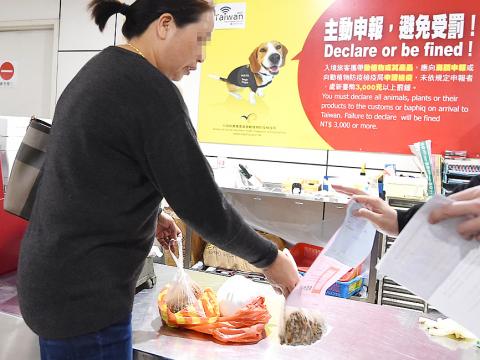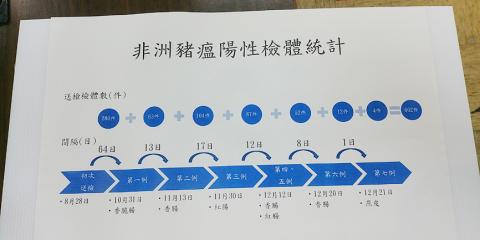Another sample taken from a Chinese meat product intercepted by customs officials has tested positive for African swine fever, the Council of Agriculture (COA) said yesterday, as it reaffirmed its resolve to prevent the virus from entering Taiwan.
The sample in question came from confiscated yanpi (燕皮), a type of wonton wrapper made from pork that is popular in China’s Fujian Province, COA Deputy Minister Huang Chin-cheng (黃金城) said.
Among 602 Chinese meat products sent for testing, it was the seventh sample confirmed to contain the virus, he said.

Photo: Chu Pei-hsiung, Taipei Times
Port of Taichung officials on Sunday intercepted a Taiwanese traveling from Fujian by ship, Huang said, adding that the yanpi was just one of the illegal products they were carrying.
The other six samples that tested positive for the virus were confiscated from Oct. 31 to Thursday, and came from sausages produced in China’s Liaoning, Heilongjiang and Sichuan provinces, as well as Macau, council data showed.
Although China as of yesterday was said to have reported 99 cases of African swine fever across 23 provinces, the number seems “meaningless,” given that China tends to conceal facts, Huang said, adding that the actual number might be 100 times more.

Photo: Chien Hui-ju, Taipei Times
First-time offenders caught with pork from virus-infected areas face a fine of NT$200,000 (US$6,494), while those who are repeat offenders face a maximum fine of NT$1 million, the council said.
No Europeans, Americans or Japanese have been caught carrying illegal meat products, said Huang, who earlier this week told reporters that most of those caught have been Chinese or Vietnamese spouses traveling on Republic of China (Taiwan) passports.
“Eating Chinese meat products is not good for one’s health” as the products could be made of meat cut from virus-infected pigs, he said.
The council has previously said that the virus, although deadly for pigs, cannot affect humans.
The council earlier this month said that Taiwan would join the World Organization for Animal Health’s East Asian task force for combating the spread of the disease and that the first meeting could be scheduled “at the beginning of next year.”
The council has not yet received any notice confirming the meeting’s venue and time, Bureau of Animal and Plant Health Inspection and Quarantine Deputy Director-General Tu Wen-jane (杜文珍) said.
However, the meeting would be an important occasion for officials from Taiwan and other Asian countries to exchange information about the disease, she added.

Taiwan is to commence mass production of the Tien Kung (天弓, “Sky Bow”) III, IV and V missiles by the second quarter of this year if the legislature approves the government’s NT$1.25 trillion (US$39.78 billion) special defense budget, an official said yesterday. Commenting on condition of anonymity, a defense official with knowledge of the matter said that the advanced systems are expected to provide crucial capabilities against ballistic and cruise missiles for the proposed “T-Dome,” an advanced, multi-layered air defense network. The Tien Kung III is an air defense missile with a maximum interception altitude of 35km. The Tien Kung IV and V

The disruption of 941 flights in and out of Taiwan due to China’s large-scale military exercises was no accident, but rather the result of a “quasi-blockade” used to simulate creating the air and sea routes needed for an amphibious landing, a military expert said. The disruptions occurred on Tuesday and lasted about 10 hours as China conducted live-fire drills in the Taiwan Strait. The Civil Aviation Administration (CAA) said the exercises affected 857 international flights and 84 domestic flights, affecting more than 100,000 travelers. Su Tzu-yun (蘇紫雲), a research fellow at the government-sponsored Institute for National Defense and Security Research, said the air

Taiwan lacks effective and cost-efficient armaments to intercept rockets, making the planned “T-Dome” interception system necessary, two experts said on Tuesday. The concerns were raised after China’s military fired two waves of rockets during live-fire drills around Taiwan on Tuesday, part of two-day exercises code-named “Justice Mission 2025.” The first wave involved 17 rockets launched at 9am from Pingtan in China’s Fujian Province, according to Lieutenant General Hsieh Jih-sheng (謝日升) of the Office of the Deputy Chief of the General Staff for Intelligence at the Ministry of National Defense. Those rockets landed 70 nautical miles (129.6km) northeast of Keelung without flying over Taiwan,

City buses in Taipei and New Taipei City, as well as the Taipei MRT, would on Saturday begin accepting QR code payments from five electronic payment providers, the Taipei Department of Transportation said yesterday. The new option would allow passengers to use the “transportation QR code” feature from EasyWallet, iPass Money, iCash Pay, Jkopay or PXPay Plus. Passengers should open their preferred electronic payment app, select the “transportation code” — not the regular payment code — unlock it, and scan the code at ticket readers or gates, General Planning Division Director-General Liu Kuo-chu (劉國著) said. People should move through the